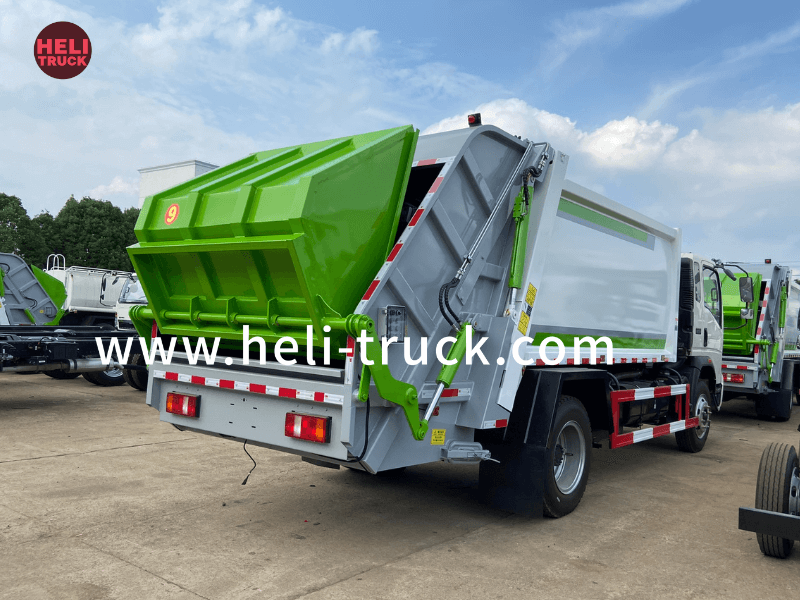The Evolution and Efficiency of Garbage Truck Compactors

Introduction
Garbage truck compactors play a crucial role in modern waste management systems by efficiently collecting and compacting waste materials to maximize the volume of trash that can be transported and processed. These specialized vehicles have evolved over time, incorporating advanced technologies and design features to enhance their performance and environmental sustainability. In this comprehensive guide, we will explore the history, function, types, benefits, and future of garbage truck compactors in a detailed 3000-word article.
History of Garbage Truck Compactors
The concept of compacting waste to reduce its volume dates back to the early 20th century when municipalities and private waste management companies sought more efficient ways to collect and transport garbage. The first garbage truck compactors were developed in the 1920s and featured basic hydraulic systems that compressed the waste inside the vehicle's container.
As the demand for more sophisticated waste management solutions grew, manufacturers began to innovate and improve the design of garbage truck compactors. By continue reading this.. -20th century, compactors became standard equipment on most garbage trucks, allowing them to collect larger quantities of waste and make fewer trips to disposal sites.
Types of Garbage Truck Compactors
Garbage truck compactors come in various types and configurations to suit different waste collection needs and operational requirements. The three main types of garbage truck compactors are:
1. Rear Loader Compactors: Rear loader compactors are the most common type of garbage trucks used for residential waste collection. These vehicles feature a hydraulic compactor mechanism at the rear of the truck that compresses the waste as it is loaded into the hopper. Rear loader compactors are ideal for collecting household waste from curbside bins and dumpsters.
2. Front Loader Compactors: Front loader compactors are designed for commercial and industrial waste collection. These trucks have a hydraulic compactor mechanism at the front of the vehicle, allowing them to pick up and compact large dumpsters and commercial waste containers. Front loader compactors are commonly used by businesses, restaurants, and apartment complexes.
3. Side Loader Compactors: Side loader compactors are designed for areas with limited access or narrow streets where rear or front loader trucks may have difficulty maneuvering. These trucks feature a hydraulic compactor mechanism on the side of the vehicle, allowing them to collect and compact waste from curbside bins without the need for additional handling equipment.
Benefits of Garbage Truck Compactors
Garbage truck compactors offer a wide range of benefits for waste management organizations, municipalities, and the environment. Some of the key benefits of using garbage truck compactors include:
1. Increased Efficiency: Garbage truck compactors can compress waste materials to a fraction of their original volume, allowing them to collect and transport larger quantities of trash in fewer trips. This efficiency helps reduce fuel consumption, labor costs, and vehicle maintenance while maximizing the productivity of waste collection operations.
2. Improved Hygiene and Safety: Garbage truck compactors help contain and compact waste within sealed containers, reducing the risk of littering, odors, and potential hazards associated with unsecured garbage. By minimizing the exposure of waste collectors to harmful substances and pathogens, compactors enhance the overall hygiene and safety of waste collection processes.
3. Environmental Sustainability: Garbage truck compactors play a vital role in promoting environmental sustainability by reducing the volume of waste that ends up in landfills. By compacting waste materials more efficiently, compactors help conserve valuable landfill space, minimize methane emissions from decomposing organic waste, and promote recycling and resource recovery initiatives.
4. Cost Savings: Garbage truck compactors can deliver significant cost savings for waste management organizations through improved operational efficiency, reduced transportation costs, and lower disposal fees. By maximizing the payload capacity of each collection trip, compactors help optimize resource utilization and enhance the financial sustainability of waste management services.
Future Trends and Innovations
The future of garbage truck compactors is driven by ongoing technological advancements, sustainability initiatives, and regulatory requirements aimed at improving waste management practices and reducing environmental impacts. Some of the key trends and innovations shaping the future of garbage truck compactors include:
1. Smart Waste Management Systems: The integration of IoT (Internet of Things) technology and sensors in garbage truck compactors enables real-time monitoring of waste collection routes, fill levels, and operational performance. Smart waste management systems help optimize collection schedules, reduce fuel consumption, and enhance service quality through data-driven decision-making.
2. Alternative Fuel Options: As the demand for sustainable transportation solutions grows, garbage truck manufacturers are exploring alternative fuel options such as electric, hybrid, and CNG (Compressed Natural Gas) propulsion systems. By transitioning to cleaner and renewable energy sources, garbage truck compactors can reduce greenhouse gas emissions and contribute to a greener urban environment.

3. Autonomous and Robotic Systems: The development of autonomous and robotic systems for garbage truck compactors is revolutionizing waste collection processes by enabling unmanned operation, route optimization, and automated waste sorting. Autonomous compactors equipped with AI (Artificial Intelligence) and machine learning algorithms can enhance operational efficiency and safety while reducing labor costs.
4. Circular Economy Practices: Garbage truck compactors are increasingly being integrated into circular economy models that promote resource recovery, recycling, and sustainable waste management practices. By compacting and segregating waste materials at the source, compactors facilitate the recovery of valuable resources and promote a closed-loop approach to waste management.
Conclusion
Garbage truck compactors play a critical role in modern waste management systems by enhancing the efficiency, hygiene, and sustainability of waste collection and disposal processes. With continued innovation and technological advancements, garbage truck compactors are poised to drive positive environmental and economic outcomes for communities around the world. By embracing smart waste management solutions, alternative fuel options, autonomous systems, and circular economy practices, the future of garbage truck compactors looks promising in shaping a cleaner, greener, and more sustainable urban environment.
